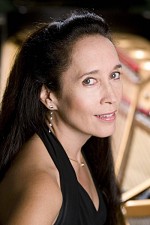Column Name
Title
Evening Division piano faculty member Julie Jordan (M.M. ’83), the second oldest of eight children, was born in Chicago and grew up in the San Francisco Bay area. In addition to Juilliard, she studied at Dominican University of California (B.M.), U.C.L.A. (M.F.A.), and the Manhattan School of Music (D.M.A.). She produces a regular concert series, Julie Jordan Presents New York Concerti Sinfonietta, and also teaches private students. This year marks her 25th season on the Evening Division faculty.
Body
When did you first know you wanted to be a musician and how did you come to know it?
I got hooked in high school on the privilege and discipline of piano study with Russian pianist Tanya Ury, an assistant to Edwin Fischer. I gave performances in many San Francisco Bay area venues and grew to love concertos, which was part of the inspiration of my Evening Division class “The Piano Concerto,” which focuses on both the rich repertoire of the concerto and the drama between a soloist and a full orchestra.
Who was the teacher or mentor who most inspired you when you were growing up and what did you learn from that person?
Aube Tzerko was the teacher who truly showed me and his other students how to listen and therefore reap the best from the practice studios—that is, how to become our own best teacher. It has been my goal to pass on that skill on to my students. Tzerko (a disciple of Artur Schnabel) taught only master classes, and at first, these open lessons made me and my fellow students feel self-conscious. But they helped us carve out our confidence and style and also learn the art of listening to our own sound and projecting the character of any given phrase. One truly can learn from listening to others, as the universal truths are clearly more illuminated by example and more powerful when shared.
What was the first recording that you remember hearing or buying and what was its significance to you?
Prokofiev’s Piano Concerto No. 3 in C Major played by Emil Gilels. As a freshman at Dominican College, I heard Gita Karasik (who studied with one of my teachers, Adolph Baller) play it with the Santa Rosa Symphony.
What’s the most embarrassing moment you’ve had as a performer?
As in sports and theater, I’d rather recall it as a response to the excitement of a challenging moment. I think it was in the eighth grade: I was performing Mendelssohn with a local youth orchestra on a concert grand piano whose wheels weren’t locked. I soon realized with every solo passage that my main goal was not only to “make it to the coda” while enjoying the journey, but also, during the tutti, to subtly scoot up and keep the piano from rolling into the cello section!
If you could have your students visit any place in the world, where would it be, and why?
I love to bring my students wherever my summer travels take me—so far we have gone to Capri, the Greek Islands, the Adriatic seaside, and medieval Italian villages. This summer I will invite a few to join me in Lago Maggiore, and next summer, Sweden.
What are your non-music related interests or hobbies?
I am always fascinated with sports because of their excitement, drama, and in-the-moment challenges. The nuance of tennis [champions’] net game in the early ’80s reminds me of the possible color and incredible touches that produce the most dramatic diminuendi and freedom of playing the piano. With the bigger racquets—and huge-sound European pianos—a new baseline power game has developed and the focus is no longer on finesse. I prefer a technique that has layers of innuendo and complexity that create a balance of voices, such as that of a great string quartet or pianists like Arthur Rubinstein, Martha Argerich, Andras Schiff, Leif Ove Andsnes, and like souls.
If your students could only remember one thing from your teaching, what would it be?
Start with a thought—and don’t forget to breathe.
What is your favorite thing about New York City?
That it is really just a big group of villages connected by foot, rail, restaurants, and buildings. As a two-time N.Y.C. Marathoner I believe that if you can last for an hour, your running shoes—along with the high-fives of New Yorkers—will carry you through all five boroughs.
What book are you reading right now, or what CD are you listening to?
Right now my daily bread is reflections for Lent and Easter week. I find listening is always a luxury for musicians with a life packed with music, so I choose to listen to live music, because time is precious, and I love to catch up with my students, friends, and soloists who have performed in their own projects as well as mine.
If you weren’t in the career you are in, what would you be doing?
I love dancing, sharing delicious meals, and, most recently, writing about what inspires.
Is there anything you’d like to add?
My brother Michael often reminds me that I am fortunate to be able to make a living doing what I love: performing and teaching. In addition to my teachers, schools, and exhilarating summer programs, I am most blessed with my parents; they are still my favorite audience.





